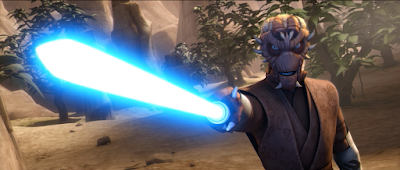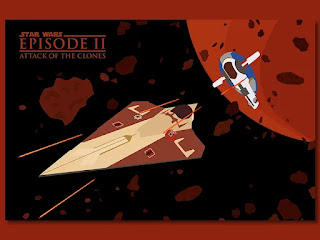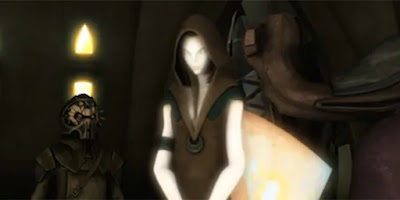THE CLONE WARS EPISODES 301/303
WATCH REPORT FOR: February 26, 2022
WATCHED: The Clone Wars "Clone Cadets" and "Supply Lines"
SUMMARY: Five clones, known collectively as the Domino Squadron, have yet to pass their final exam to become ARC Troopers. They seem bound for permanent non-combat duty until they manage to set aside their differences and work together to graduate.
Meanwhile, a Separatist blockade of the planet Ry'loth has created a humanitarian crisis for the native Twileks. While folk hero Cham Syndulla and Jedi Master Di fight droid armies, Senator Bail Organa and Representative Jar-Jar Binks work together to convince the king of Toydaria to allow the Republic to use his homeworld as a loading base for relief supplies.
OVERALL REVIEW: There are some interesting ideas in "Clone Cadets" and also some weird ones. Let's start with the weird ones first, which I'll just bullet out here:
- All the Jedi masters immediately became generals in the Army of the Republic once the war started, but they aren't professional soldiers and don't know how to train the clones. So they rely on outside help from bounty hunters like Bric and El-Les. Not mercenaries, bounty hunters.
- The clones are by definition genetically identical, and have all been raised together and trained together, but they all have different personalities and strengths and weaknesses on the battlefield.
- The Republic has access to unlimited battle droids and super battle droids, for training purposes, despite the fact that the Separatists have a monopoly on battle droid production (I think?) but the Republic still insists on using clone troopers excusively in combat.
- One of the tenets of trooper training is "leave no man behind" which sounds very noble and good-guy appropriate but also seems at odds with the idea of millions of disposable clone "units" being mass produced at will.
- The Kaminoans, despite being the galaxy's foremost experts in cloning techniques and technology, need fresh donor genetic material at regular intervals, and given that Jango Fett is dead, can't actually produce infinite units for the Army of the Republic.
(I have to Google how to spell Sifo Dyas's name every time and given some things I've glimpsed I know that there might be parts of The Clone Wars series which attempt to fill in or plaster over these plot holes. If so, please don't give me any spoilers. I'll get to them eventually.
At any rate, other than the weird head-scratchers above, it is a perfectly serviceable side story from the grunts' perspective, with an emotional throughline about teamwork and persistence and all that good stuff. And it does raise the interesting point that, if there is significant variation among clones, not all will be perfetly suited for the same jobs, or for combat at all, and it bears thinking about what happens to the ones who wash out. We will no doubt return to this idea in viewings to come.
"Supply Lines" has ... Jar-Jar. But at least it plays to his strengths! At one point Bail's plan to pull a fast one on the Nemoidians, who are lobbying the Toydarian king to remain perfectly neutral and therefore not assist the Republic in any way, requires a distraction. So Jar-Jar gets to be a clown and provide said distraction (via juggling and balancing the glasses and plates at a diplomatic banquet, also lending more credence to the popular fan theory that Jar-Jar is a secret Sith with Force abilities that allow him to defy physics) and, okay, that's fine. And I've already beat up on The Phantom Menace for its ugly alien-cultures-are-racial-stereotypes tendencies, so I'll just acknowledge that the Nemoidians are dialed down a bit and the Toydarians are given some cultural depth and nobility which makes Watto more of an outlier.
Of course, this brings up something I mentioned in my review of The Clone Wars pilot/theatrical movie. Bail Organa is diplomatting like crazy to get the Toydarians to agree to a token amount of assistance, and the king is torn between their sacred cultural value of compassion and their commitment to neutrality ... after the leader of the Separatists got busted for kidnapping a child, plotting to murder said child, and attempting to pin it all on the Jedi and the Republic. The whole storyline of The Clone Wars really wants to have its cake and eat it too, simultaneously insisting that war is complicated and everything is in nuanced shades of gray while portraying Dooku and the Separatists as cartoonishly evil.
The thing that intrigued me the most here was the fate of Jedi Master Ima-Gun Di. I must pause and acknowledge that his name is an absolutely unforgivable pun. The Clone Wars' first war crime right here, ladies and gentlemen. In case it isn't abundantly clear, his name sounds like "I'mma gonna die" when you say it out loud, and sure enough, he does die at the end, and once you get past the groaner, you can at least respect what is being done there. Namely, it shows that the Jedi are not invincible. Of course Coleman Trebor (RIP) already taught us this valuable lesson, but that was a death at the hands of Jango Fett. Master Di is killed by battle droids, showing that even a Jedi master can be overcome by sufficient numbers of rank and file troops when sufficiently pushed to the limit. It's good foreshadowing of Order 66, a reminder that for all of Obi-Wan and Anakin and Ahsoka's plot armor, this whole series is not exactly heading towards a happy ending.
HOW MANY TIMES DOES ANAKIN HANG UP ON OBI-WAN? Anakin isn't in these episodes. It's all to the good that the series takes such a broad view of the war, allowing some episodes to sidestep the protagonists entirely and focus on secondary characters, it just doesn't help with this particular element of my recaps, alas.



Comments
Post a Comment